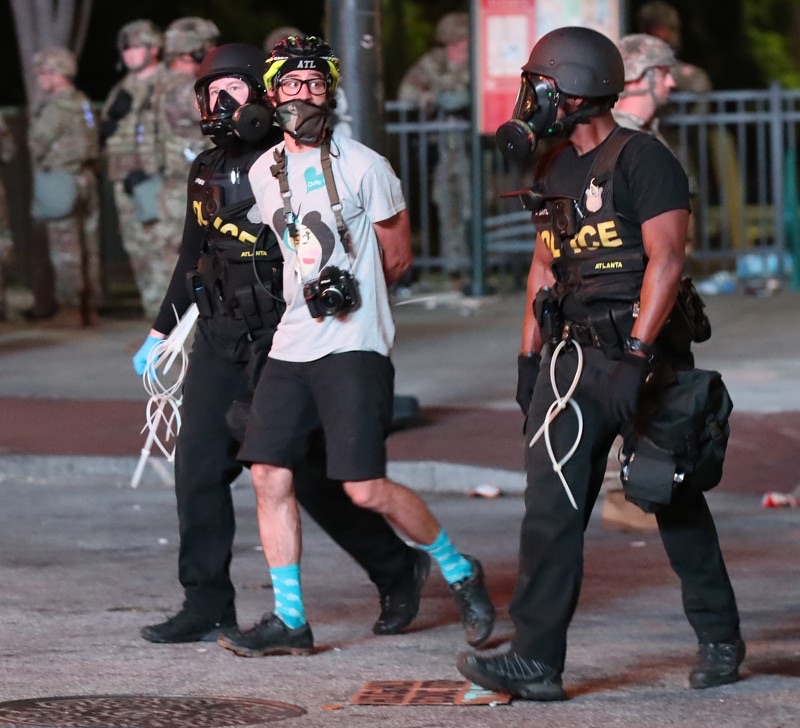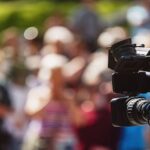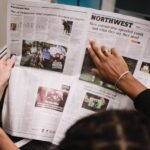
The University of Georgia School of Law’s First Amendment Clinic and civil rights attorneys Gerald Weber and Leigh Finlayson secured a $105,000 settlement from the City of Atlanta on behalf of photojournalist Sharif Hassan who was arrested in Atlanta during the 2020 Black Lives Matter demonstrations in retaliation for exercising his First Amendment right to record the police.
On May 25, 2020, George Floyd was murdered by Minneapolis police, sparking nationwide protests, including in Atlanta. In response, on May 29, 2020, Atlanta Mayor Keisha Lance Bottoms issued a blanket curfew order for the City, beginning at 9:00 pm. Unlike similar curfew orders in other major U.S. cities, Mayor Bottoms’ order did not include any exception for members of the media engaged in news gathering.
On the evening of June 1, 2020, Mr. Hassan was photographing the Black Lives Matter protests occurring in downtown Atlanta. Seconds after he began taking pictures of Atlanta police officers making an arrest on a public street, he was forced to the ground and handcuffed. This was two minutes after the curfew went into effect. Despite Mr. Hassan’s repeatedly identifying himself as a working journalist, he was nonetheless arrested and charged with violating Mayor Bottom’s curfew. Meanwhile, other members of the media in the same area of Mr. Hassan’s arrest were permitted to continue their news gathering after 9 p.m. without interference.
Mr. Hassan was put in jail overnight, where he was handcuffed in a cell by himself for many hours. He continued to face criminal prosecution for over six months, until the City dismissed the charge against him for what it claimed were “evidentiary reasons.”
In addition to the monetary component, the settlement includes the following language on consideration of media in the event of any future curfew orders:
The parties further agree that in the event an Executive or other Order, is necessary to establish a city-wide curfew, the City Law Department may consider including in the proposed text of such Executive Order(s) that working members of the media are included in any curfew exceptions or carveouts for people engaged in work activities, for people traveling to and from work, or for essential workers, provided such working members of the media do not intentionally impede or intentionally disrupt law enforcement.
“This resolution sends an important message that First Amendment rights must be protected, including, and especially, during times of political and social upheaval,” says First Amendment Clinic Director Clare Norins. “It is essential that working members of the media be allowed to observe and report on matters of public concern, including after-curfew interactions between civilians and the Atlanta Police Department.”
“I brought this lawsuit to hold the City accountable for hastily creating a police state while leaving our rights as journalists as an afterthought,” Mr. Hassan explains. “Clarity and communication during these times [of public discourse] is critical for the safety of citizens, journalists and police officers. Unlawful arrest while being separated and handcuffed through the night is something that should not happen to members of the press. The goal is to ensure that our rights are protected in the future.”
Mr. Hassan’s attorney Gerry Weber notes that “because citizens now frequently film police brutality, eyes have opened, demonstrations have occurred, and more Americans have begun to understand systemic flaws in law enforcement. Yet, police interference with filming has become far too commonplace,” says Weber. “Sharif Hassan was doing his job, as a journalist, and his arrest silenced him. That was the point.”
Co-counsel Leigh Finlayson adds that “journalists and everyday citizens have a right to film police activities. As a society, we are all better off when such filming occurs, and the truth is recorded. No one should be jailed and put through Hell for exercising this sacred Constitutional right.”
The First Amendment is not suspended during protests, even in the face of unrest and uncertainty. In fact, these are the situations in which First Amendment protections are most important.
Related press:
- Associated Press, “Atlanta to Pay Journalist $105K to Settle Lawsuit Over 2020 Protest Arrest,” Daily Report (May 10, 2023)
- Claire Simms, “Atlanta pays settlement to photojournalist arrested during George Floyd protests,” Fox 5 Atlanta (May 9, 2023)
- Riley Bunch, “Atlanta to pay settlement to photojournalist arrested in 2020,” Atlanta Journal-Constitution (May 8, 2023)
- John Ruch, “Atlanta pays $105K to settle journalist’s arrest lawsuit as protest cases mount,” SaportaReport (May 8, 2023)
Many thanks to the following Clinic students, law fellows, and interns who worked on this litigation over the course of 2020 to 2023 under the supervision of Clinic Director Clare R. Norins: Lindsey Floyd, Allyson Veile, Warren “Ren” Schmitt, Mackenzie Ferguson, Marlene Berroa Rodriguez, Ashley Waterfill, Mark Bennett, David Afahame, Katie Freeman, Amy Morgia, Daniel Zimmer, and Samantha Hamilton.

The Issue
Right to Record
The First Amendment generally protects the right to gather information about what public officials do on public property, which includes the right to record matters of public interest. Although this right is clearly established, some government officials try to prevent or retaliate against those who record them. Read more about our advocacy for the right…
Explore Issue
The Issue
Media Law
The First Amendment guarantees a free press, meaning journalists are able to express any opinions they want about the government, even criticisms. However, journalists are often hindered in their ability to gather and publish news through the threat of lawsuits, subpoenas, and criminal prosecution. Read more about our support for student and professional journalists here.
Explore Issue